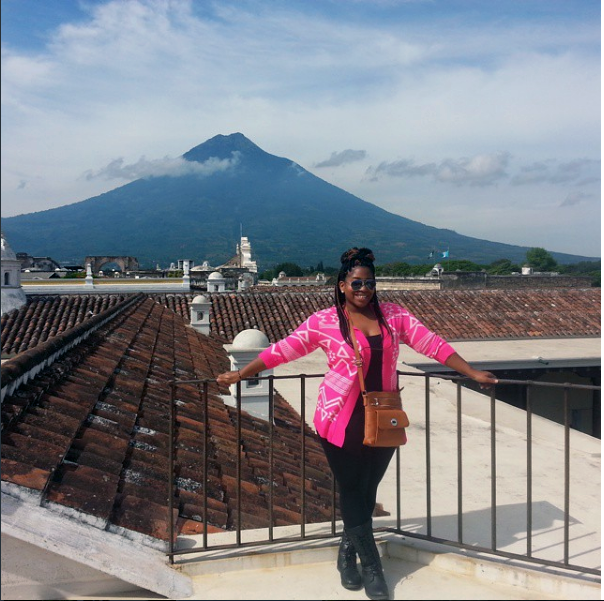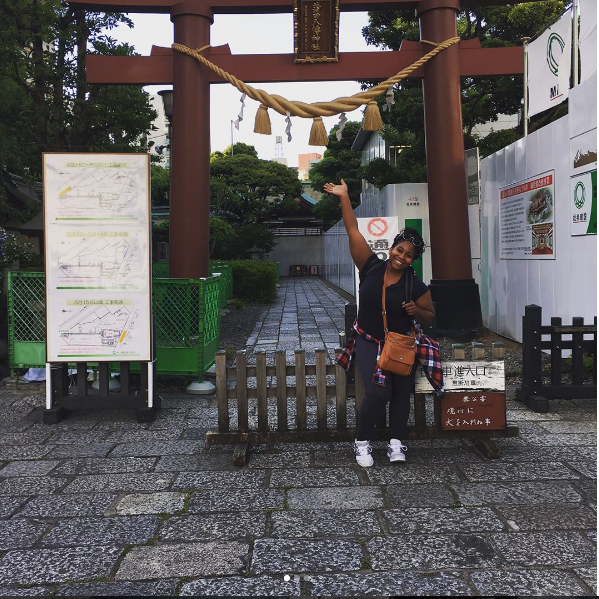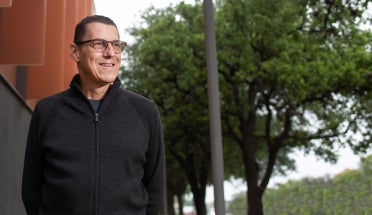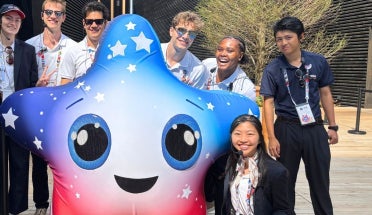
Washington Motivates Students of Color to Explore the World
- Oct 13, 2017
- Education Abroad
Not even the Great Wall of China can stop LaShawn Washington. Despite breaking and dislocating her ankle after visiting the world heritage site, Washington's adventurous spirit and enthusiasm for learning about new languages and cultures allowed her to continue seeing the beauty of traveling and meeting people from other parts of the globe. "I got to see a side of China that [a visitor] does not get to see in the streets on everyday interactions,” she describes. “I have no regrets. I had a great time."
Washington is a true Longhorn. She received her bachelor’s degree in Government in 2016 and is currently pursuing her master's in Cultural Studies in Education in the College of Education. She became an advocate for studying abroad after participating in the faculty-led program in Antigua, Guatemala as an undergraduate student. She uses this experience to mentor students in the Fearless Leadership Institute (FLI). Her passion for learning is motivational and her positive energy is contagious.
LaShawn, when and where did you study abroad?
I studied abroad in the summer of 2015 in Antigua, Guatemala. It was a summer one program and it changed my trajectory in education. That is why I am getting my master’s in Cultural Studies in Education.
How did you select your program? Who was your program coordinator?
My program coordinator was Dan Siefken and we worked as a team. The reason why I chose Guatemala was because it is in Central America and I am a Spanish enthusiast. As an undergraduate, I was really good at reading and writing but I was really slow with my conversational Spanish and I wanted to improve that skill.
Did you know anything about Antigua or Guatemala before going abroad? What did you do to prepare for your study abroad experience?
I just knew that it was a great program since one of my friends had already participated in it. I saw pictures and I did some research, but nothing specifically. Yet, I was very intentional about improving my Spanish skills, so I took a language course before I went abroad.
What lessons did you learn from your first study abroad adventure?
The biggest takeaway that I got from studying abroad was learning about my privilege. I always equated privilege to other groups or other genders and I did not know that I had privilege as an African American woman. The program also allowed me to understand that there are different ways of understanding the world and each one of them is valid.
Where did you travel next?
Next, I traveled to Tokyo, Japan and then Bejing, China. I was afforded the opportunity to travel to China with Dr. Leonard Moore and Dr. Charles Lu and the Social Entrepreneurship Program in China and the US with the Longhorn Center for Academic Excellence. My role as a graduate assistant for the Fearless Leadership Institute (FLI) allowed me to travel to this country and support FLI students participating in the program. Before China, I traveled to Tokyo for a week and had an amazing time. I learned about Asian culture and how it is not monolithic.


Tell us about your role as Graduate Assistant for the Fearless Leadership Institute.
I love my position as Graduate Assistant for the Fearless Leadership Institute. I was part of the program when I was an undergraduate student and I wanted to continue working with it because it is transformational. We have retreats every year where we take about 100 minority women off campus. We help them develop professionally, academically, and personally.
We pair students with different mentors. We guide them with their career goals and graduate school. We do workshops and events regarding love, relationships and 'situationships.' I help them with event planning and execution.
How have your experiences abroad helped you mentor students—specifically women of color—who are thinking of studying abroad?
If there is any event or a fair, I will go between classes and just talk about the program and my experience.
Anytime that I encounter minority women who are thinking of studying abroad I encourage them to go. Even if they are not, I motivate them to get out of their shell and go.
A lot of people do not want to study abroad because there is fear— especially because they have never left the country. Some people's parents have never left the state. In those cases, I tell them that studying abroad will change their lives, in general. I tell this to everyone, but especially minority women because it opens up their frame of thinking.

Why should students from underrepresented backgrounds study abroad?
In my opinion, students from underrepresented backgrounds should study abroad because the experience teaches you about other people's cultures and backgrounds.
What advice would you give to first-generation students?
As a first-generation college student and graduate student, it took me eight years to get my bachelor's degree. I took a long time. I am just getting my master's.
My advice to students is just to keep going. If you are determined to get a degree, no one can stop you, except yourself. You have to believe in yourself. The sky is not the limit; it is only your view. I would encourage you to expand your view and see what the world has to offer.
Do you have any recommendations to students who are thinking of studying abroad?
Go where you want to go. Do not go to a program just because everyone else is going. Complete your application and see if you get in. I know there is an application fee, but I know that you can spend a lot more for less of an experience.
Research the program and go and talk to the professors. Check if it is a faculty-led or an affiliate one. Do a lot of research. Contact people. Do not let your fears stop you.
What are two things students should leave behind when studying abroad?
You should not pack a lot of clothes. You are not trying to be fashionable when studying abroad. You are just trying to make it through. No need to be extra fancy.
For ladies—do not pack more than one pair of heels.
So far, do you think that studying abroad has contributed to your professional development? If so, how?
Absolutely. My Spanish skills improved when I was in Guatemala. I am an intermediate conversational Spanish speaker and bilingual, on a good day. I can interact with more people and whenever they see that I studied abroad they want to know more about it.
How are you planning to integrate your experiences into your career?
My career goal is to work in higher education. I love higher education. I want to give back the experience that I obtained as a first-generation college student. I would like to study abroad as a graduate student, but also to continue taking students to study abroad—especially minority students because I believe [the experience] really develops you as a person.
What is next for you?
I am looking forward to applying to Ph.D. programs and continuing my education. I would also like to study abroad next year. Additionally, I will continue to work with the Fearless Leadership Institute.
Lastly, what is your favorite country and why?
Still has to be Guatemala. I feel connected to Guatemalan culture. Latin culture is not monolithic and I just appreciated and respected it. I will always have a place in my heart for Latin culture and Guatemalan culture, specifically.



